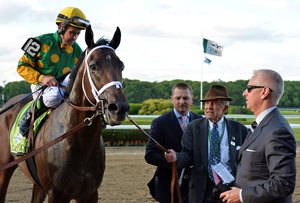Industry Voices: Cot Campbell


I am a freshly minted nonagenarian, and I have found that one encounters the occasional slow day. During such a lull, I decided to look into the overall financial careers of those Dogwood horses that have run in seven Kentucky Derbys (G1).
I was flabbergasted with what I discovered.
In a 23-year period (1990-2013), Dogwood Stable partnerships ran eight horses in seven Kentucky Derbys. We ran second, third, and fourth, and came away with wonderful memories and $230,000. But when the last horse ended his career, the eight horses—bought at public auctions for a collective $1,233,000—had grossed a staggering $31,685,454! This came through both racetrack earnings and breeding farm deals.
What this says, of course, (duh!) is that good horses run in Kentucky Derbys, and—Derby accomplishments or not, and industry woes or not—there are stunning purses to be won before and after, and even more spectacular opportunities at stud.
The eight Dogwood horses yielded more than 26 times what they originally cost. There figured to be a few blockbusters in the group; and, happily, there were. Several more were plenty useful, and there were two that had no business in the Derby and did not make much of a footprint later.
The interesting question: Would any major racing stable (e.g. Reddam Racing, Gary and Mary West, Live Oak, John Oxley, West Point, Eclipse, Team Valor, etc), with eight Derby runners throughout several decades, have fared as well? I would think so. Maybe even better. But this 26-to-1 ratio of earnings to purchase price might have been hard to match.
Dogwood's eight purchases, averaging $154,125, would be very much more on the frugal side than the pattern of the average significant outfit of recent years. The highest price we paid was $300,000 for Summer Squall. The lowest was Smilin Singin Sam—$30,000. The former won the Preakness Stakes (G1) and a lot more. The latter won the Remington Park Derby, and little else. The four Derby runners that became racing millionaires—Summer Squall, Palace Malice , Wallenda, and Limehouse —averaged $170,750 when bought.
The other four and their purchase prices were Smilin Singin Sam ($30,000), Trippi ($65,000), Jack Flash ($195,000), and Impeachment ($260,000). One of these—the fine sprinter Trippi—has had a sterling stud career at Ocala Stud and is now flourishing in South Africa.
The farms involved would not want specific purchase prices bandied about, but it is harmless to disclose that Summer Squall, Palace Malice, Trippi, and Limehouse collectively generated $23,300,000 for their partners when stallion duty deals were consummated.
In revisiting all this, I have assigned only $300,000 stud revenue to Wallenda, a grade 1 stakes-winning ($1,205,929) son of Gulch. This is erring on the side of conservatism because his stud career was complicated and unsuccessful, and the details murky now to boot. He got off to a slow start in Kentucky, was sent to Japan, where he was not popular, went downhill, and alarmingly faced euthanasia. Dogwood—when alerted by the wonderful Old Friends watchdogs—"bought" him from the Japanese for an extortionary $10 grand. We brought him home, and he lived out his days at Old Friends.
No breeding monetary return was assigned to Impeachment, though there was a pittance. Third in the Tampa Bay, Arkansas (G2), and Kentucky Derbys and then the Preakness, efforts were made to syndicate him in Florida, but there was no stampede to buy shares in this stayer. He ended up in Canada.
Smilin Singin Sam's breeding potential was gloomy, and mostly talk. He had some occasional fun, but his meager breeding earnings are not worth calculating. Jack Flash went jumping—as a gelding—and then enjoyed life as a show horse.
While only a total of $230,000 came from the three Derby-placing checks, the eight horses ultimately grossed $8,385,254 on various racetracks. That figure then, combined with cautiously calculated breeding revenue, created total gross income of $31,685,454. This is dramatically more than I would have dreamed, if hazarding a guess before all the research. Top racetrack earner was Palace Malice at $2,676,135, besting Summer Squall's $1,844,282—dollars earned 23 years earlier. Wallenda rated third in the standings with $1,205,929, with Limehouse at $1,110,433. Trippi, toiling in sprints, earned $666,220. Impeachment, $350,450. Smiling Singin Sam, $271,005. Jack Flash, $271,000.
It is stunning what these large, four-legged animals can do for one's livelihood. It is also clearly substantiated that most of them can have a negative outcome. No horseman ever lived who could consistently identify the good ones. Therein lies the charm.
Cot Campbell is the founder of Dogwood Stable.
